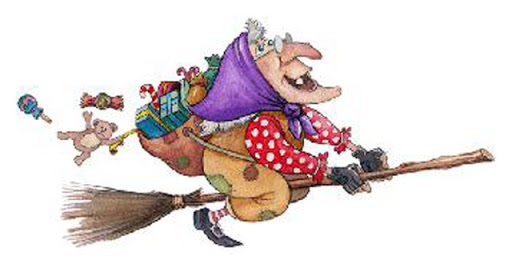Italy: La Befana – a Christmas tradition

Rome: Italians celebrate the religious feast of the Epiphany, or the more popular folklore version of La Befana, on 6 January which falls on a Wednesday in 2021.
It is a national holiday across Italy, with public offices closed, and marks the official end of the Christmas season.
In the Bible tradition the feast of the Epiphany is when the Three Wise Men arrive in Bethlehem bearing gifts for Baby Jesus on the 12th day of Christmas.
However in the popular fairytale version the story goes that the wise men invited a witch-like woman, or strega, to join them on their journey to bring gifts to the Christ child.
She initially refused, due to being too busy with housework, but then tried to follow them. Unable to find Jesus the kind-hearted Befana gave the toys to other children.
Although overshadowed by the modern tradition of Santa Claus, La Befana remains adored by Italian children, who hang up their stockings in anticipation of gifts on the nights between 5 and 6 January.
The stockings are placed by windows or over fireplaces, with a glass of wine or some Christmas treats such as panettone or pandoro often left out as refreshments for La Befana.
Children who have been good normally receive sweets while those who have misbehaved will get lumps of coal – which these days can be black rock candy.
After depositing her gifts, the soot-covered old hag is known for sweeping up the house before hopping on her broomstick again.
The folklore tradition has been celebrated in Italy in one form or another for centuries, possibly growing out of ancient pagan rituals or descended from the Sabine/Roman goddess named Strenia.
La Befana is most associated with Rome and central Italy but the custom spread to the rest of the country during the 20th century.
In the Italian capital there is usually a Befana Christmas market in Piazza Navona however it was not held this year due to the covid-19 crisis.
As a national holiday and a holy day, public offices will be closed across Italy on 6 January 2021, with most schools reopening the next day. La Befana also marks the last ‘red zone’ day during Italy’s lockdown restrictions.





